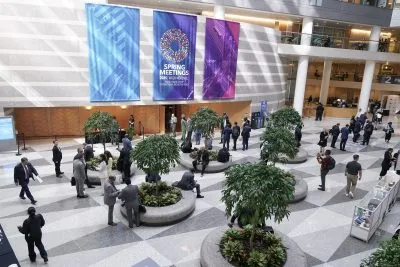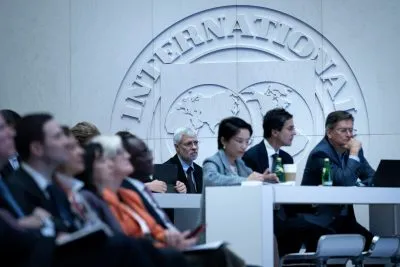At the close of 2019, sub-Saharan Africa had an enviable record of economic performance. Over the previous 20 years, the region’s average GDP in real terms grew at 4.84%/year; the corresponding rate for all emerging markets was 4.75%.
While many factors contributed to this outcome, such as the “commodities supercycle”, those of us who work on the ground in Africa know well such performance was driven significantly by the implementation of hard-won economic reforms, chosen judiciously from a larger number that were (and still are) needed.
Over the course of 2020, Covid-19’s tragic effects on the health of Africans and its scarring of the continent’s economies and stymying of trade and investment flows from abroad pushed the region into its first recession in 25 years, with growth contracting by about 3%. Today, 40m Africans are thought to be falling into extreme poverty.
How the continent rebounds will, once again, be determined by African leaders’ abilities and willingness to execute sound governance, fiscal, investment, trade and social insurance policies that encourage domestic businesses to increase investment.
That task is especially challenging: not only will there be a need to “claw back” progress made from the previously implemented policies in these areas, but additional actions from the unfinished reform agenda will be required to restore – and indeed surpass – the continent’s former growth trajectory.
While not understating the tasks that lie ahead, there should be confidence that important progress in this regard can be attained. Why? Because the previous record is a robust empirical demonstration to Africa’s leaders, businesses, workers, and consumers that reforms do pay off.
The notion of “in Africa, it too can be done”, is equally significant for foreign investors – both those already operating in the region and the ones who are contemplating doing so – as they can also be important catalysts for growth and innovation. Critically, a number of key reforms needed to promote domestic investment by Africans are at the same time needed to stimulate such activity by foreign investors.
Here are three of the most salient policy areas on which African leaders should focus reforms, discussed in the order of how much progress has been made to date.
Lower intra-African barriers
Africa’s leadership is to be commended for devising the African Continental Free Trade Agreement (AfCFTA), which was for years just a twinkle in the eye of those of us who questioned the utility of the “spaghetti bowl” of regional economic communities, which did little to diminish barriers to African states’ bias against buying and selling goods and services from and to each other.
Having become operational on 1 January, 2021, at which time 36 of the 54 signatories had already deposited their ratification instruments with the African Union Commission, the AfCFTA could well be the most important cross-cutting economic reform the continent can take to push its growth prospects to the next level.
Beyond ensuring the rest of the region signs on, the AfCFTA’s effectiveness in transforming the competitiveness of the continent into a unified internal market imbued with capital and labour mobility will turn on establishing a new pan-African financing mechanism to facilitate these processes continent-wide.
It is an imperative step. African leaders should learn from the mistakes other regions have made, including the US, in designing trade adjustment assistance to not undercut the realisation of benefits otherwise generated by advances in trade policy.
Foster competition between Chinese firms and companies from advanced democracies
Far too many firms and investors in advanced democratic countries, especially the US and UK, are unaware of the extent of Africa’s economic accomplishments and promise. This presents an opportune time for African businesses and leaders to erase these misperceptions in two dimensions.
First, US and UK leaders are eager to forge new foreign commercial relationships. This is most obvious for the post-Brexit UK, which has a desire to “strike out on its own” now that the country operates outside of the previous trade obligations that tethered it to the EU.
In the US, in contrast to the previous administration where, at best Africa was ignored, and at worst, degraded, President Biden knows the continent; is a seasoned international relations practitioner; and is assembling a team to foster US firms’ investment and trade with Africa.
The US and UK are keener than ever for their firms to compete head to head with China, not only domestically but in third country markets. They are increasingly aware their companies have been behind the ball in Africa regarding China.
Africans can gain by promoting competition between Chinese and US and UK firms on the continent. It’s a no-brainer that African business leaders not only should do roadshows in the US and UK but also invite their counterparts to do the same in Africa.
Second, the magnitude and nature of Chinese debt in a number of African states is an economic time bomb – think Zambia and Ethiopia. With few exceptions the loans are the product of non-transparent deals between Beijing and African governing elites. They only perpetuate pre-existing domestic governance gaps between the aims of those in power and society writ large.
Worse still, as debt burdens have grown in the wake of the Covid-generated recession, the lack of transparency mandated by China in these loans severely handicaps African countries taking full advantage of the G20’s Debt Service Suspension Initiative.
This will severely constrain Africa’s macroeconomic management and recovery. Replacing this regime with concessionary transparent financing by advanced country democracies – even grants, as in the US Marshall Plan – could be a game-changer.
Adherence to rule of law
Compared to other emerging markets, most African countries have a perpetual allergy to adhering to the rule of law. The barriers are complex and multi-dimensional, rooted in the continent’s history. Where progress has been made, back-sliding often occurs.
But something promising is emerging: some leaders look to what other countries on the continent are accomplishing on this score and how they’re enticing world-class investors. That kind of intra-regional competition is a powerful incentive.
Still, it’s far too nascent. Some countries are becoming even more immune to reform. Djibouti is the poster child here. Its already well-known case flouting the rules of international arbitration for investment dispute settlement by unilaterally abrogating the 30-year port concession agreement it signed onto in 2006 with DP World and ceding control to China Merchants is evincing increasingly self-destructive conduct.
After losing several cases on the matter, including before a tribunal comprised of judges chosen jointly by Djibouti and DP World under the auspices of the London Court of International Arbitration – the institution agreed to in the text of the concession – and failing to return control of the port and pay damages awarded by the tribunal, Djibouti is bringing the case to a local court, contending that under domestic law the concession’s stipulations regarding international arbitration are now illegal in Djibouti.
At this juncture, one can only wonder what kind of economic future the government is creating for the nation’s citizens.
Harry G Broadman is managing director and chair of the Emerging Markets Practice at Berkeley Research Group LLC and on the faculty of Johns Hopkins University.
Want to continue reading? Subscribe today.
You've read all your free articles for this month! Subscribe now to enjoy full access to our content.
Digital Monthly
£8.00 / month
Receive full unlimited access to our articles, opinions, podcasts and more.
Digital Yearly
£70.00 / year
Our best value offer - save £26 and gain access to all of our digital content for an entire year!

 Sign in with Google
Sign in with Google 






